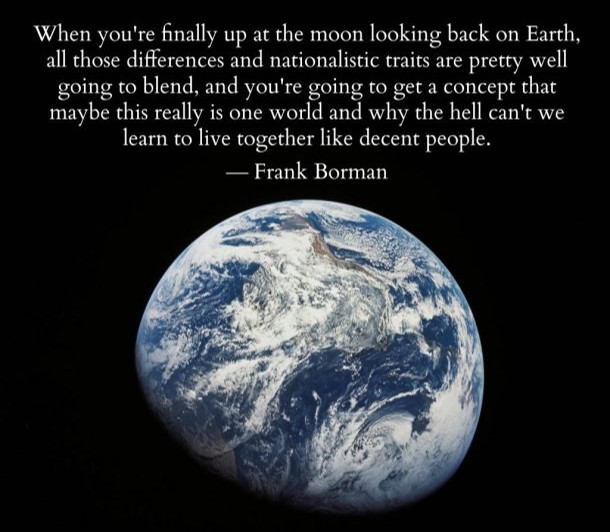
COSMIC PERSPECTIVE FOR A BETTER WORLD
When astronauts return from space, many of them report that their outlook of life on Earth has been transformed forever. They experience a sort of spiritual awakening which leads them to ponder how we could all live better on our beautiful planet as one human fraternity.
A number of astronauts have suggested that world leaders should also orbit the Earth to feel the same overwhelming sense of oneness when taking in the whole planet in a single glimpse. This image produces a life-changing sense of awe for astronauts and should similarly cause politicians to see the world anew.
National borders are artificial divisions and therefore invisible when you are orbiting the Earth. Anyone gazing down at Earth from space sees a single entity, not 195 sovereign nations. This holistic view brings about a cognitive shift in awareness among astronauts – the so-called “Overview Effect”.
This psychological switch causes some astronauts to develop a global consciousness which alters their worldview. Seeing Earth from the vantage point of space is a profound experience that can inspire an overwhelming desire to protect our planet – from ourselves!
Tiny planet Earth is where we worship our gods, fight our wars, and destroy our environment. The fragility of our planet and the pettiness of territorial lines become blindingly clear when seen against the dark expanse of the universe.
Of course, very few of us will get to look back at Earth from a spaceship. Even so, a Dutch company is trying to replicate that experience for school children with an education program called SpaceBuzz. With the aid of some whiz-bang technology, the company wants to “send” 100 million kids a year to space using immersive 4D virtual reality.
Putting children in the footsteps of astronauts will hopefully enable them to feel the Overview Effect for themselves and see the bigger picture. SpaceBuzz is designed to give children a deeper sense of connection with the wonderous living system we call Earth and every living thing inhabiting it.
SpaceBuzz will help the next generation of adults become more Earth conscious by living sustainable and eco-friendly lifestyles. But how do we assist the current crop of adults to be kinder to the planet and each other? One way is to provide them with role models to emulate.
Unfortunately, those who should be examples to all of us – politicians – often fall short of the mark. Politicians the world over tend to focus on local issues to the detriment of global challenges. Global problems, though, can only be solved through shared, collective leadership.
The current day peddlers of populism appeal to the prejudices of voters by tapping into prevailing anti-immigration and anti-trade sentiments. Yet the populist framing of problems invariably leads to the wrong policy responses such as the desire to build walls and erect trade barriers.
That’s why all world leaders should experience a simulated SpaceBuzz virtual flight so that they – like astronauts – can look down at the Earth and its 7.8 billion human inhabitants and embrace a new reality. All humans need to see themselves as connected with one another and with the planet as a whole.
From space, nationalism, patriotism, and tribal behaviour have no meaning – you see just one planet and it’s the only home we have. On witnessing Earth from space, astronaut Edgar Mitchell proclaimed that it makes you:
… develop an instant global consciousness, a people orientation, an intense dissatisfaction with the state of the world, and a compulsion to do something about it. From out there on the moon, international politics look so petty. You want to grab a politician by the scruff of the neck and drag him a quarter of a million miles out and say, ‘Look at that, you son of a bitch.’
Former NASA astronaut, Ron Garan, poetically described how the spectacle of Earth suspended in space was an epiphany in slow motion.
From space, the planet is a constantly changing masterpiece and the sheer beauty is absolutely breathtaking. It looks like a shining jewel and you realise that it’s home to everyone who ever lived and everyone who ever will be. But another thing that hit me was a sobering contradiction between the beauty of our planet and the unfortunate realities of life on our planet. It filled me with a sense of injustice. It infuriated me.
On Earth, politicians are accused of not seeing the forest for the trees. From space, the reverse applies – they will see the forest but not the trees. As Einstein explained, the nature of reality depends on the position of the observer. Our frame of reference is flipped when viewing Earth from outside its atmosphere and this gives rise to an altered state of consciousness.
Hopefully, the sensations triggered by the sight of our planet from space would be sufficiently moving to cause world leaders to transcend borders in their decision making. Narrow-minded national government agendas must give way to collective action to tackle shared global challenges, such as the need to eradicate extreme poverty, improve health outcomes, create a sustainable planet, and foster world peace.
We have the capability to solve all the problems facing humanity including world peace. In space, American astronauts and Russian cosmonauts work side-by-side on the International Space Station (ISS), even though we cannot secure peace on Earth. This is ironic as the ISS emerged from the Cold War rivalry of the Space Race between the Soviet Union and the US.
On Earth, nations continue to butt heads, however, on the ISS, 15 countries work collaboratively in an orbiting laboratory for the good of all humankind. The ISS represents the largest peacetime cooperative effort humans have ever conceived and implemented. It is as much a political achievement as a technological one.
The ISS is a shining example of a common goal bringing a divided world together. It has become a beacon of peace for warring nations and proves that we can accomplish remarkable things together. The ISS has also demonstrated that the politics of nationalism must give way to a “one planet” ideology if we are to achieve greater social cohesion.
Regrettably, moving from 195 independent nation-states to one planetary civilisation is not on humanity’s radar, so it certainly won’t happen in my lifetime nor my children’s. But in the words of legendary astronomer and science writer, Carl Sagan: “You spend even a little time contemplating the Earth from orbit and the most deeply ingrained nationalisms begin to erode”. Space can heal what divides us.
Even though we need a cosmic perspective, most world leaders are either not ready or are incapable of making that paradigm shift in thinking. In fairness, viewing the world through a global lens has not pervaded the hearts and minds of most citizens either. So, for now, we will continue our journey through the universe aboard Spaceship Earth as a divided crew.
We are all astronauts – we just don’t know it.
Before you go…
I wrote this post shortly before Russia launched a full-scale military invasion of Ukraine and acknowledge that the war has strained international collaboration in space. The conflict makes it even more urgent for politicians to experience the Overview Effect and for our political leaders to embrace a whole-of-Earth perspective, particularly during times of geopolitical upheaval.
Regards
Paul J. Thomas
Chief Executive Officer
Ductus Consulting


I often see two sides of the coin. One side of my coin tells me that developing earth as “one human fraternity” is a wonderful ideal. Let’s hope that after a trip into space our politicians see it the same way. The other side of my coin tells me we should send our politicians into space on a one-way ticket. Space buzz is a great concept – thank you for bringing it to our attention. No matter what, earth is a most astonishing planet. Good work Paul, thank you.